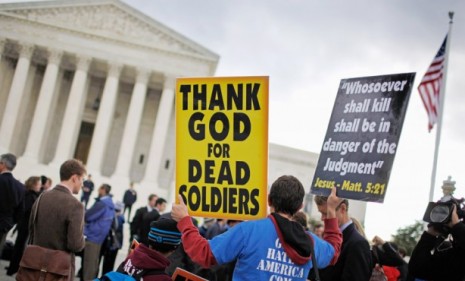Is 'Thank God for dead soldiers' protected speech?
A father whose son's funeral was disrupted by the infamous Westboro Baptist Church wants damages for emotional distress. Should the Supreme Court side with him?

A free daily email with the biggest news stories of the day – and the best features from TheWeek.com
You are now subscribed
Your newsletter sign-up was successful
The Supreme Court heard oral arguments on Wednesday in a case that could redefine what constitutes free speech under the First Amendment. In the case, the father of slain Marine Lance Cpl. Matthew Snyder sued the small Kansas-based Westboro Baptist Church for emotional distress after church members protested outside his son's funeral with signs such as "Thank God for Dead Soldiers." Snyder was awarded $5 million in damages by a Maryland court for emotional distress, but that judgment was overturned on free speech grounds. Were Rev. Fred Phelps and his Westboro clan within their First Amendment rights? (Watch the group defend itself)
Privacy trumps targeted hate speech: Freedom of expression plays a "vital role in our democracy," says Maryland Attorney General Doug Gansler in The Washington Post, but the protestors' right to "express their hate" isn't absolute. The Supreme Court should limit hate speech "targeted at individuals during moments as private as a funeral," so other families don't have to suffer the same incurable wrong.
"Anti-gay minister shouldn't be able to intrude on soldiers' funerals"
The Week
Escape your echo chamber. Get the facts behind the news, plus analysis from multiple perspectives.

Sign up for The Week's Free Newsletters
From our morning news briefing to a weekly Good News Newsletter, get the best of The Week delivered directly to your inbox.
From our morning news briefing to a weekly Good News Newsletter, get the best of The Week delivered directly to your inbox.
Westboro was within its rights: The Westboro protests are "deeply repugnant," says The New York Times in an editorial, but the Supreme Court has a history of siding with "odious" groups in First Amendment cases, including Hustler and the American Nazi Party. "Strong language about large issues," like U.S. war policy, needs strong protections, "even when it is hard to do so."
Just ignore Phelps: That's "the sound argument," says Tim Rutten in the Los Angeles Times, but it's "a bloodless one." The Snyders, after all, are private citizens whose grief was exploited and amplified by "lunatics," and "do we really want a society that makes no private place for grief?" Regardless of the inevitably "unsatisfying" court ruling, the media should do its part by ignoring this publicity-seeking "hate church."
A free daily email with the biggest news stories of the day – and the best features from TheWeek.com
"Pissed off jurists" make bad law: Judging by the oral arguments, "at least a few of the justices really, really, really just hate the Phelps family and its manner of protest," says Dahlia Lithwick in Slate, and it looks like they are "willing to whip up a little new First Amendment law to prove it." That's too bad. Reading the Constitution through "hate-colored glasses" is a recipe for "very bad precedent."
-
 Buddhist monks’ US walk for peace
Buddhist monks’ US walk for peaceUnder the Radar Crowds have turned out on the roads from California to Washington and ‘millions are finding hope in their journey’
-
 American universities are losing ground to their foreign counterparts
American universities are losing ground to their foreign counterpartsThe Explainer While Harvard is still near the top, other colleges have slipped
-
 How to navigate dating apps to find ‘the one’
How to navigate dating apps to find ‘the one’The Week Recommends Put an end to endless swiping and make real romantic connections
-
 The billionaires’ wealth tax: a catastrophe for California?
The billionaires’ wealth tax: a catastrophe for California?Talking Point Peter Thiel and Larry Page preparing to change state residency
-
 Bari Weiss’ ‘60 Minutes’ scandal is about more than one report
Bari Weiss’ ‘60 Minutes’ scandal is about more than one reportIN THE SPOTLIGHT By blocking an approved segment on a controversial prison holding US deportees in El Salvador, the editor-in-chief of CBS News has become the main story
-
 Has Zohran Mamdani shown the Democrats how to win again?
Has Zohran Mamdani shown the Democrats how to win again?Today’s Big Question New York City mayoral election touted as victory for left-wing populists but moderate centrist wins elsewhere present more complex path for Democratic Party
-
 Millions turn out for anti-Trump ‘No Kings’ rallies
Millions turn out for anti-Trump ‘No Kings’ ralliesSpeed Read An estimated 7 million people participated, 2 million more than at the first ‘No Kings’ protest in June
-
 Ghislaine Maxwell: angling for a Trump pardon
Ghislaine Maxwell: angling for a Trump pardonTalking Point Convicted sex trafficker's testimony could shed new light on president's links to Jeffrey Epstein
-
 The last words and final moments of 40 presidents
The last words and final moments of 40 presidentsThe Explainer Some are eloquent quotes worthy of the holders of the highest office in the nation, and others... aren't
-
 The JFK files: the truth at last?
The JFK files: the truth at last?In The Spotlight More than 64,000 previously classified documents relating the 1963 assassination of John F. Kennedy have been released by the Trump administration
-
 'Seriously, not literally': how should the world take Donald Trump?
'Seriously, not literally': how should the world take Donald Trump?Today's big question White House rhetoric and reality look likely to become increasingly blurred